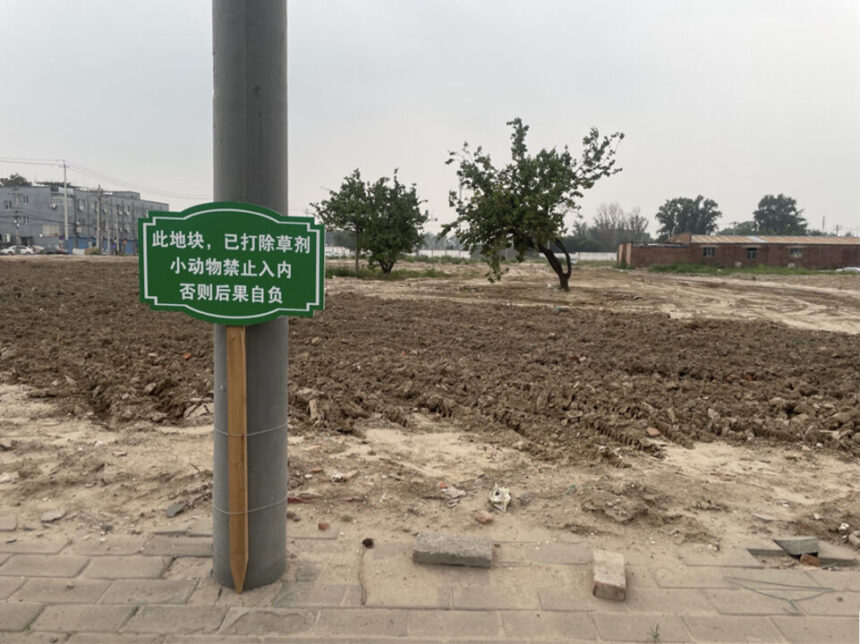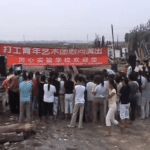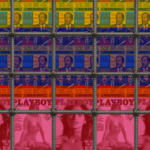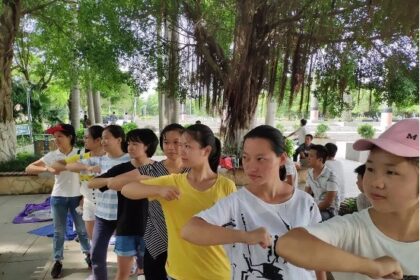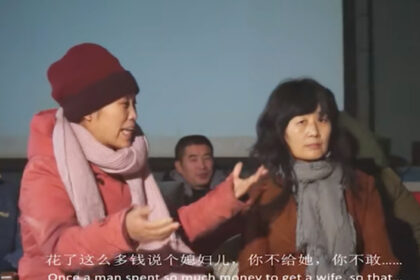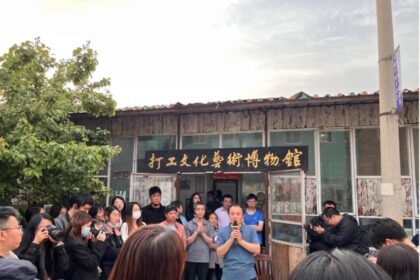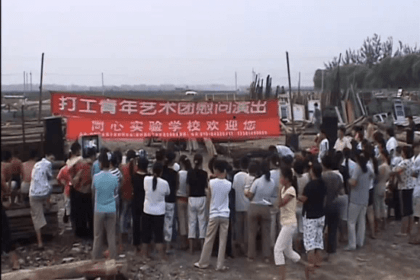Stories of Picun: An Interview with Xiaojing
Interview by Yuxiang Dong, Yanhua Zhou, and Wei Wu
This interview took place on January 23rd, 2023, through the platform Tencent.
Xiaojing is currently an educational worker and was a volunteer at the Migrant Workers
Home, Picun, Beijing, during which he worked with the organization’s leaders, staff, and
other migrant workers and developed his understanding of the organization. However,
this understanding was different from some of his friends. The complexity was beyond
his expectation. He thought he was not “warm and affective (温情) ” enough. But
literature will lose its value if it retreats arbitrarily.
Dong: To begin with, we have some very basic questions. When and why did you come to Picun and how was the process?
Xiaojing: I came to Beijing in August 2017 and first lived in Tongzhou District. But I wanted to go to Picun to have a look after Fan Yusu became famous. The first time I was in Picun was the Dragon Boat Festival. The Migrant Workers Home organized a gala for everyone in Picun. I have never seen this kind of event in the past. Also, the rent in Picun was quite cheap, so I decided to move here. I worked in Guangzhou, during which I read two magazines Jiangmen Literature and Art (江门文艺) and Foshan Literature and Art (佛山文艺). The authors and audiences of these two magazines were mainly migrant workers. Wang Shiyue (王十月) and Zheng Xiaoqiong (郑小琼), two former migrant workers, were offered the position of editor of the magazines by the government of Guangzhou municipality after winning the People’s Literature Awards (人民文学奖), solving their problems of household registration (户口) and status in working units (编制). The district level governments in Shenzhen municipality distribute special fundings to non-official literature newspapers. The communications between the government and the civil are non-organizational, informal, and loose with the creation of literature works. However, in Picun, intellectuals and labor organizations participated in the Migrant Workers Home. I wanted to study the similarities and differences between these two forms.
I was not very close to them at the beginning. Some teachers would like to talk about big ideas like “revolution” “subjectivity” and “oppression”, which made me feel that there were barriers between us. The Migrant Workers Home has a drama group. I used to participate in their rehearsals and have meals. At that point, I wanted to quit my job since it was meaningless to work nine to six Monday to Friday without any private time. Instead, I hoped to write about the Migrant Workers Home anywhere and anytime. But it was hard because of financial pressure. Therefore, I had many temporary jobs and took a break whenever there were activities in the Migrant Workers Home. So that I could consistently observe the operation of this organization. It was a difficult period – no heat in winter or AC in summer, and I ate with others from the same “big pot” (大锅饭). I certainly managed to overcome these difficulties as I was so excited, and everything was new to me. I even tried my best to defend the organization’s “reputation.” In a WeChat group, I condemned a girl who reposted an article about female volunteers sexually harassed by a former staff member. But later, this faith collapsed.
Dong: we are curious about this process of collapsing.
Xiaojing: At first, I was extremely curious about the Migrant Workers Home as I never saw this kind of organization before. It uses a clear slogan to build legitimacy. I am particularly curious about whether a social enterprise like the Tongxinhuhui has gray areas just like all other enterprises. I wanted to investigate secrets and tension within the relationship between people, labor, and capital. The writing process was like piecing together a broken map, which was exciting, stirring, and thorough. I had limited engagement with the Tongxinhuhui as a volunteer but found something uncomfortable: forced labor. There were three main workplaces for staff in Tongxinhuhui: the office, the store, and the warehouse. There were two men, both in their fifties or sixties; a disabled manager; and several women between their thirties and fifties in the warehouse. The job was to collect clothes from the outside and take most of them to the store to sell. Clothes that could not be sold in-store needed to be put into woven bags, loaded into the truck, and sold as scrap.
On scrap trading days, there were never enough people to load clothes into the truck. The driver never wanted to do it, and everyone would find excuses to avoid this task. People only helped when Wang Dezhi asked them because he was in charge of the store. They used to hire and pay other worker friends to load clothes. Later, they bought a belt conveyor to transport woven bags of clothes to the truck, which was a great relief. A staff member in his sixties, a fellow-villager of Wang Dezhi, once had an argument with the manager since the manager criticized that he was always just killing time during work. After the argument Wang told the manager to give that person some easier work. However, there was no hard work except loading woven bags into the truck. Another guy in his fifties was the most hard-working and contributed the most when loading the truck. Once he was hiding in a corner without any response when people were calling out to him. He only showed up after everything was finished. You see, even the most hardworking man was resisting. He mainly worked in the warehouse and usually had to ride an electric trike to deliver clothes to stores since women working in stores did not have much experience riding the vehicle. One day it was raining, he asked a driver to help with delivering clothes, but the driver refused. He moaned about the selfishness of humanity. He worked for several years without social security and remarked bitterly that others were “dawdling for social security.” (混社保)
Working in the warehouse fully revealed the discipline against people. And people there believed that physical work was the best and could provide the best exercise. I knew a volunteer who directly rejected loading and unloading trucks in the warehouse when asked by the leaders. Also, another volunteer, a college student, loaded trucks once. When he was asked to load the truck for the second time, he was smart – he left the dormitory until the following morning when the loading was finished. The vice manager complained: “you escaped from your duty, buddy.” It seems that no one was willing to take physical jobs. Once I did not participate in that task, and the vice manager told me that: “If you work, you can eat. You cannot be like this next time.” They did not consider my contribution to literature and art as labor, but only physical labor as real labor. You had to do physical labor to deserve food. This made me very uncomfortable.
Zhou: I think these small stories are meaningful even on their own because they reflect the reality of life.
Xiaojing: The Migrant Workers Home has now developed into a relationship bound by marriage, which strengthened this fragile organization and improved its ability to defend risks. I think this point is quite thought-provoking.
Zhou: What do you think was the purpose of their marriage? To strengthen the organization’s unity by getting married? Or getting married because they are in the same organization and then the marriage made these connections stronger?
Xiaojing: I think it is more likely to be the second one, but you cannot completely separate them. Living in the same environment, people are influenced by a certain ideology directly and indirectly. Suffering from the market, they already felt their lives were failures. The 60 year old uncle I mentioned (working in the warehouse), his daughter married the vice manager of this organization. She was doing temporary jobs such as selling insurance after graduating from college and finally ended up working for the Migrant Workers Home. The uncle felt that if his daughter could enter graduate school, she would not be here anymore. There were many reluctances and sadness. A girl has to get married at a certain age. To entrust her life to someone in this organization is better than being alone. And to become relatives of the leaders can allow one to receive greater care from the organization.
Dong: You wrote about the latrine in Picun. I think it represents the conflict between the dream and reality. Can you talk more about it?
Xiaojing: Clothes donors from the city and foreign students who just paid a visit, when they saw the latrine in Picun, they always shook their heads and left. For the managers in Picun, the latrine was unstable and might be demolished at any time, therefore they saw no need to spend money renovating it. I put on a mask when they asked me to plunge the latrine. They quoted Mao: “young people need to work in rural and mountainous areas to get an education from the people.” I was really uncomfortable as they were lecturing me. Also, there was a sign on the wall of the latrine saying, “outsiders not allowed.” It was hilarious as we were all laborers, but we kept others out of our toilet, as if we assumed outsiders to be more dirty, stinky, and unhygienic. Who are the “people”? Can they accept both people’s thoughts and their poo? In fact, the legitimacy of this organization is the concept that “we are all exploited.” Regarding this, I wrote a paragraph: “with a casual move of the racket, the table tennis ball rolled besides the latrine. No one picked it up. It became a dead body.” I think it was a great metaphor. But in fact, we should have picked it up as we should not show any disgust when facing the filthy latrine in this circumstance. Rather, you should get closer to the masses. Villagers in the past used to pick up feces and use it to fertilize farmland.
Dong: What do you think is the main problem for the Migrant Workers Home now? In our previous conversations, you mentioned the lack of talent, democracy, and intellectuals. We want to know more about that.
Xiaojing: I think I was overthinking when mentioning intellectuals in the past. In terms of their relationship with intellectuals, maybe it was collaboration? Or utilization? Or both. Unlike leaders in the past who had revolutionary and political organizing abilities, managers of the Migrant Workers Home cannot make intellectuals willingly serve the organization. For example, they (including some intellectuals) like to talk about Liu Qing (柳青), who was sent to the countryside as an intellectual, and then fully committed to contributing to the countryside. He revealed the “reality” of rural areas in his work, like a tamed intellectual who was sincerely convinced by the spirit of the Yan’an Forum on Literature and Art. On the other hand, intellectuals nowadays are relatively free and not willing to be controlled like that. Also, the operation of this organization, including promotion to the public and classes of the literature group, still needs intellectuals.
Dong: In a different perspective, from your point of view, what is the relationship between Picun and the government?
Xiaojing: I do not think the Migrant Workers Home is that important for the government. It is just a grassroots political organization, or a township-level organization. The organization has suffered from brutal and unjust treatments, such as destroying their heating equipment. Members of the literature group and intellectuals with close connections with the Migrant Workers Home tried a variety of ways to fight for the organization. Some wrote letters to the party secretary of the district, some posted articles on personal media, and others expressed their opinions with media organizations. In terms of the relationship between Migrant Workers Home and local communities, as far as I have observed, many people just participated in their activities to get free gifts, donations received from the society. Most of them were immigrants with some local people. They just wanted to take advantage of the activities to get free stuff like milk, soap, and cough syrup. Old ladies came to crowded events, signed their names, got things for free and then left. People came not because of ideological recognition, but for interests. Besides, there was also a worker friend, who only attended events when there was something to eat or drink. His participation was driven by interest as well. Basically, people like free things, they just join these activities for fun, like celebrating a festival. But it is hard to say how much sense of belonging they have. Even for the public square dancing, we can only hear pop music, whose themes are mainly love and money, no resistance against capitalists or injustice. This is the problem; you cannot have any ideological influence on people in this space.
Dong: In Picun, residents’ participation in the Migrant Workers Home’s activities was mostly driven by material reasons?
Xiaojing: There are activities for certain festivals, where children, adults, and old people gathered around in that space to celebrate together. It is quite interesting and satisfying. People who always participate in the literature group’s activities certainly have stronger feelings than those who prefer material interests. Teachers temporarily put down their social status and identity, such as professors and new Beijingers, to be with worker friends. When the Migrant Workers Home needs advertising, people who are deeply engaged with the literature group will be the spokesmen and a kind of influencer. Just like Fan Yusu said: “each scholar is divine and admirable.” This is the highest praise for intellectuals. After events, intellectuals would drive students back home, give them books as presents, and pay for the meal, which is really recreating a utopia.
Zhou: It feels like people in the literature group are completely devoted, while the rest might have other motivations. Are they driven by material interests?
Xiaojing: Yes, or they wanted lively and vibrant environment, or just to not be lonely.
Zhou: In general, they did not join because of a sense of belonging to the community or the purpose of promoting the new workers’ literature. Instead, they were driven by daily and private purposes. I think it is common when it comes to community engagement for art projects. Organizers usually have to give rice, eggs, or oil for free to get residents engaged.
Xiaojing: Yes indeed.
Dong: Then why were there still some people who were really devoted to activities related to the literature group and the Migrant Workers Home?
Xiaojing: Literature is the most convenient way with the least barrier for individuals to express their mental state and situation. People need to know one to two thousand characters and can write smooth sentences. With some revisions, the work can basically reach most people. In this environment, participants feel warmed and encourage each other. Scholars are pretty humble, and the boundary between teachers and students is even blurred. There is no exam or competition, people understand each other, and teachers work hard to prepare classes. All these things contributed to a friendly relationship. A relative of a worker friend got sick, teachers made a lot of donations, which was really touching. This friendship was priceless. Intellectuals put down their status and built a community with worker friends. This relationship is invaluable.
Wu: Thanks for sharing with us today, I think it is quite productive. I want to ask about the close relationship you mentioned in the literature group, like comradeship, in which so called “class barriers” were removed temporarily and everyone was well connected with each other. Why is it that this mode cannot be expanded to the whole community? What are the obstacles? Why can’t everyone, including those who are not in the literature group, have good experiences?
Xiaojing: I think some people might just be into literature while others are not. They are probably into other forms of literature and art, like TikTok or WeChat short videos. It is hard for one to engage with this group if they do not like literature. There used to be a truck driver in his forties, who occasionally attended a “good-looking” teacher’s classes. The teacher was over thirty and the classes were about eloquence and etiquette. The driver went there to ease his “sexual anxiety.” Some people worship the power and believe in “Daddy Ma” (Jack Ma) [Ma Yun, also known as Jack Ma, the co-founder of Alibaba Group and Yunfeng Capital], while others look up to and admire academia. The drama group once produced a play about workers, but a driver made a disparaging comment “what play did you produce?” Maybe he could only accept pop music and video games. There were also some university students who came for the literature group. They left some compliments and pleasantries but never came back. People’s adaptability and comprehension determine whether they stay or leave. There was a master student who wrote in their paper that only political and economic factors can help workers’ current situation, while literature and art cannot provide essential help. His opinion certainly received pushbacks in that context.
Dong: Do you agree with this? It is hard for literature and art to solve worker’s problems in political, economic and social aspects.
Xiaojing: I partially agree with it. But art or literature can actually bring a positive impact on people’s lives, or probably even help with symptoms of depression. These assistant capacities do exist. For example, an artist taught a domestic worker in the literature group to paint and express herself boldly. Then she sketched for members of the group and published her works. It did not matter whether the publishing platform was WeChat or print publications, she got more confident. The evaluation system in the countryside takes people more seriously as long as they can publish their works. In this instance, the domestic worker changed the husband-dominated situation in her family. Of course, legal and medical interventions are more effective than art intervention and can bring direct changes to people’s fate.
Dong: Was there anything or anyone else that had an important impact on Picun and the Migrant Workers Home when you were there?
Xiaojing: The Migrant Workers Home asserts that they try to solve problems for all human beings, a way to liberate humanity. It is ambitious, noble, and mind blowing. Under these circumstances, girls who were sexually assaulted were told to prioritize the organization’s interests and protect it from any harm although they had to suffer [1].
This reminded me a story of bystanders. Once we were rehearsing for a play. There were three of us, including a male staff member, a girl wearing ripped jeans, and me. A male worker friend in his thirties kept trying to touch the girl’s knee although she was uncomfortable with it and stepping back all the time. The male staff member and I did nothing to stop that worker friend as he ultimately did not actually touch the girl’s skin. After he left, I said that the worker friend was rubbish, yet the male staff member replied: “no, you should not talk like that. How could you say he is rubbish?” As a male myself, I have enjoyed all the conveniences and privileges this patriarchal society has brought me, just like that staff member, so we lack the courage to criticize the situation when a girl is harassed to some extent.
In the end I concluded that the reason why a single old male with a rural household registration could be free from criticism in this situation was that “he is one of the vulnerable groups that we are supposed to take care of. How can we be harsh towards him just for this?” When a man is economically disadvantaged, he is less likely to find a girlfriend. Therefore, some men tend to transfer their adversity to women, and become misogynistic by accusing women of being vain and lazy, as well as demonizing women. They erase problems regarding financial and political aspects and start to be unfriendly and even attack women.
Dong: Do you think it is common in Picun?
Xiaojing: I wrote about Xiao Liu, a guy I often drink with. Once he was drunk and talked about his affairs with young women, you know, intimate relationships. But I was not sure if those things really happened or were merely illusions of a drunk man. What I mean is that it is hard to express one’s masculinity when one is economically disadvantaged. In Picun, many power relationships between men and women were reversed due to economic factors. For example, in a family, the wife may have more and more power to say something even though she is taking care of the children at home because her husband cannot earn a lot. I know another 50 year old man married to a woman who was 10 years younger than him. It was his second marriage. However, they had not enjoyed their time together for more than a year when the woman was diagnosed with heart disease. The man then had to work hard for his wife’s medical treatment. I asked him why not get a divorce. He explained that “we have been together for all these years, how can I give her up just because of a disease?” It seems that the power relationship between men and women is turning around. However, this story may not be related to gender equality, maybe just one man’s desire and protection for love.
Dong: Many stories of ordinary people were depicted in your WeChat official account “One Person’s River” (一个人的江河). Do you think there is anything especially attractive about those people for you?
Xiaojing: First of all, I started this official account to force myself to write more, rather than attracting lots of fans or to write for them. These ordinary people around me need a place to share their problems including difficulties and sufferings without any reserve. People were struggling and living a tough life in Picun with problems like migrant population, left-behind children, outsiders, and the feeling of being deprived. Literature became a form of dialogue and window for people from different social classes, yet I have no intention to speak for any particular group. Gradually, I lost my desire to write. Why? Because I wanted to write about lives of different industries, different social classes, and different occupations. For example, subaltern groups are mainly busy with their livings. I certainly want to write about a doctor, a teacher, or a policeman if given the chance… these professionals are beyond subsistence and specialized jobs have professional aesthetics, which are more attractive to me to write about. But the more I wrote about the upper-class, the more I realized that there are limited amounts of things they would share as they are more likely to protect themselves and be protected. Also, there are legal concerns as they may sue you. Stories of sex workers including A Fei, A Juan, and A Fang, I wrote about, are particularly attractive for me. Usually, it is hard to know about private lives of sex workers due to ethical concerns and their self-protection. For me, it is an unavoidable responsibility to write about their tragic experience because they are a disadvantaged group suffering from the patriarchal society, hotel managers, and the legal system.
Zhou: Did the sex workers you wrote about live in Picun?
Xiao Jing: No, they did not. I got to know them in a summer when I worked as a security guard in a 5-star hotel back in college. I had conversations with them, and I was deeply touched by their stories of encounters and suffering in this environment. There are many things I still have not written.
Zhou: Were there girls like them in Picun?
Xiaojing: Yes, there were many, but they moved out gradually due to the “cleaning campaigns” (清洁运动) in Picun, which prevented residents from leasing rooms to gamblers and sex workers. Some sex workers talked to me, hoping that I would pay for their business. But of course, I could not do that as it was illegal. They thought our conversations were a waste of time and would not want to go deeper. It would be ridiculous and impossible for me to pay and sit there just for a talk. There was an article on my WeChat official account about an unfortunate old lady who leased her place to a sex worker. I had a conflict with her as she hated outsiders. When I spoke for migrant workers, the lady said that I am an exception. But the generalization of outsiders made me very uncomfortable.
Zhou: I am curious about where these people work, in Picun? Or other places in Beijing?
Xiaojing: Just some dark alleys in Picun. Their husbands would protect them. For example, some of them take mahjong places as covers. But they are pretty straightforward about their business.
Zhou: Their husbands too? So, they do the business as couples?
Xiaojing: Yes, Pan Suiming (潘绥铭) did lots of research about it. Though husbands function as protectors, as time goes by, they tend to hate while still utilizing their wives’ reproductive organs as tools. For me, maybe this protection is a kind of evilness in humanity, or perhaps a stop gap measure to make money. This is just a speculation as we do not know the exact circumstances. Residents in Picun also have imaginations about sex workers. For instance, there was an old man from Sichuan who imagined himself as a powerful outsider who could save those sex workers from the police. They boosted their masculinity with imagination, which is quite interesting. Ironically, although he really looked down on sex workers and thought they were the “dirtiest bitches,” he would still look out for those girls. Nobody knows why those girls were willing to do it and local residents thought it was “stupid” to be with him.
Women have to compromise their humanity in difficult situations as Mo Yan (莫言) wrote that in the age of production teams (生产队时期), cadres of production teams offered girls food and sexually assaulted them. I can truly relate to their tragedies during difficult times. The other example was Xiao Liu who I wrote about. He wanted to possess all those girls, while considering opening a night club to sell them. He wanted to control and destroy the girls when he could not have them. Xiao Liu’s parents arranged his marriage to some extent, and he was barely maintaining the unfortunate marriage for the sake of his child.
Zhou: Yes, I am looking forward to your writings about this. It takes considerable efforts to dig deep into Picun to know these issues. I do believe these problems exist in Picun as I went to nail shops and talked to girls there. Also, I think it is a common phenomenon among the communities of migrant workers. I noticed many massage shops in Picun. I was not exactly sure what services they provided. My personal understanding was that there were many migrant workers who worked hard during the daytime, so they needed a massage to relax at night. I am talking about the regular massage but would not rule out the possibilities of other kinds. I do not think there is anything about sex in the Culture and Art Museum of Migrant Workers but only a part about women migrant workers.
Xiaojing: I think sex is not important for most Chinese as the ultimate goal for women is to reproduce and educate the next generation. People broadly generalize love and sex as loneliness as it sounds decent. Sex is so disgraceful that no one should talk about it. They used to say I was like a middle-aged woman who only focused on workers’ love, which was too shameful to be expressed in public. They believed the deep concern of the survival of migrant workers was more important than love, leaving sex alone.
Zhou: What do you think about the Culture and Art Museum of Migrant Workers?
Xiaojing: From the perspective of the Migrant Workers Home, the museum is like a monument, which represents the legitimacy of this organization. People will not be able to comprehend the sacrifices of migrant workers if it collapsed. Basically, the suffering of migrant workers is recorded by the existence of the museum. When leaders first proposed to build this museum, different groups of people, including veterans, sent artifacts to the organization. Sun Heng was considered a hero in visitors’ notes. However, there were still difficulties: the museum could be demolished any time, and it was hard to raise money for the rent constantly. What is the meaning of the museum after its inception? It is to attract more visitors to experience the adversities of migrant workers, so that the government might make changes to the law and social systems to improve their situation. After almost 20 years of operation, most visitors are new Beijingers, university students, intellectuals, and office workers, rather than migrant workers. Maybe workers do not know about this place, or they think it is meaningless to see their own scars, since they already experience such a difficult life. Some of them might even think it is reopening a wound. Thus, to prove it is meaningful, the museum reveals the wound for people to see. The museum can feel emboldened with justice to receive donations from the society to survive.
Although things like lowering the living expenses of migrant workers and environmental protection are all benefits brought by the organization, this cannot be the reason for them to constantly advertise the justice and legitimacy of this organization because they are not the same thing. Any charity organization can say they are doing something great. I think many other NGO’s efforts are more meaningful since they have a down-to-earth attitude that helps people in need, and never waste audiences’ time with the propaganda of “legitimacy.”
Wu: I always have a question: many reports about Picun that I have read also accused that its anti-capitalism is merely a slogan. From your point of view, what efforts has Picun (the organization) actually made to fight against capitalism?
Xiaojing: I think their efforts are mainly manifested with slogans. Of course, they did defend something. For example, when the band was still called the “New Workers Band,” some automobile brands and music programs offered them chances to endorse products and perform with the condition to change lyrics of tough accusations against capitalism. They ultimately refused. However, under other circumstances, they tend not to separate capital and capitalism, especially when they are in need of capital. Therefore, they accept financial support from some multinational conglomerates like JD, Alibaba, and Tencent unconditionally. They also received sponsorship from banks while organizing events. As our society has been moving towards capitalism, they would be powerless and left with nothing if they completely resisted capitalism. Sometimes, their efforts have become a gesture.
Generally speaking, people barely know about the Migrant Workers Home except for a few people who live in Beijing and work in this field. If you ask an outsider what the Migrant Workers Home is and where Picun is, they have no idea. For example, if you go to the US and ask a random person about the Migrant Workers Home, nobody knows about it or Picun at all. In fact, we only have a tiny influence within a small group. We feel good about ourselves and have a sense of responsibility. It is hard to generalize individuals’ opinions about this organization though.
I have a question here: is the focus of your magazine also a kind of self-entertaining in a small circle? For what purpose is an American magazine paying attention to the practices of a Chinese organization? Is the Migrant Workers Home well-known in the American art world? How can my writing practices about individuals help your understanding of this community organization?
Dong: The Migrant Workers Home does not have much influence in the American art world, but we are interested because it has a unique form of organization and practice. Usually, an organization exists with core leadership, participants from outside and inside, who have different opinions. We think you provide a quite unique perspective to learn about this organization. Finally, we also would like to know when you left Picun?
Xiaojing: It was February 2020 when I escaped Beijing – before the outbreak of the pandemic. As a Beijing drifter, an individual, I was really scared. I did not develop a lot during my time in Beijing, it was more like idling away my time. I was afraid of the virus and dying alone there. It would be a pity to die alone in Beijing. I also learned how deep and complex the society is in Picun and saw a variety of performances of all kinds of people.
I knew when I got back to my hometown, my family would rush me to find a direction since one cannot live without a purpose. I spent a few months wandering around and kept my rented room in Beijing. I was thinking about the exact meaning of my writing on the Migrant Workers Home and the time and energy spent in Picun. My friends also persuaded me to give up as they thought it was meaningless. I have given it a lot of thought and realized that it was the time for me to find a way out. I wrapped up everything in Beijing and left. I also reflected on my role in Picun when occasionally talking to my friends in Beijing, and it reminded me of a saying that: “a good writer is a good spy.” I started to think about the reasons I approached them and whether it was OK to do so. I was there with a purpose while they trusted me unconditionally. I gained their trust to get what I wanted. I was always questioning the ethical legitimacy of this behavior. However, there were no other options, and they considered me a double agent, because they knew I wanted to write in that space.
There were several reasons for me to leave the Migrant Workers Home. The first one was for my personal development; the second was forced labor. Under the influence of the pandemic, the income has dwindled, and large numbers of staff members quit their jobs. For example, a truck driver was required to transfer to work in the warehouse. He refused because the job of a truck driver was relatively flexible. He just needed to focus on the steering wheel. There were no strict rules about what to do outside and when to come back. Although working in the warehouse is not very tiring, it consumes people emotionally and the job is quite repetitive, loading clothes incessantly. Moreover, the salary was quite low initially, and the pandemic caused the decrease of the income again. Therefore, many people did not think they could make a decent living with that job and left, especially young people who want better job opportunities. The emotional bond between other people in the organization and I was cut off. Their leaving for me means a community was heading towards its end. It felt like looking at myself in the mirror–seeing the sinking boat, I realized that there was no point to trap myself in the same place. My research about this group should end.
At the end of May 2022, two yards of the Migrant Workers Home were facing demolition. Many artistic youths and middle-aged people from Beijing, and even people who travelled a great distance, gathered to say goodbye to the “spectacle.” The song “Farewell” (送别) was played at the scene, Wang Dezhi was quite emotional and said that there were less intellectuals compared to a decade ago. He hoped to overcome barriers between different social groups.
In August when I visited the place again, there was only empty land and a couple of trees.
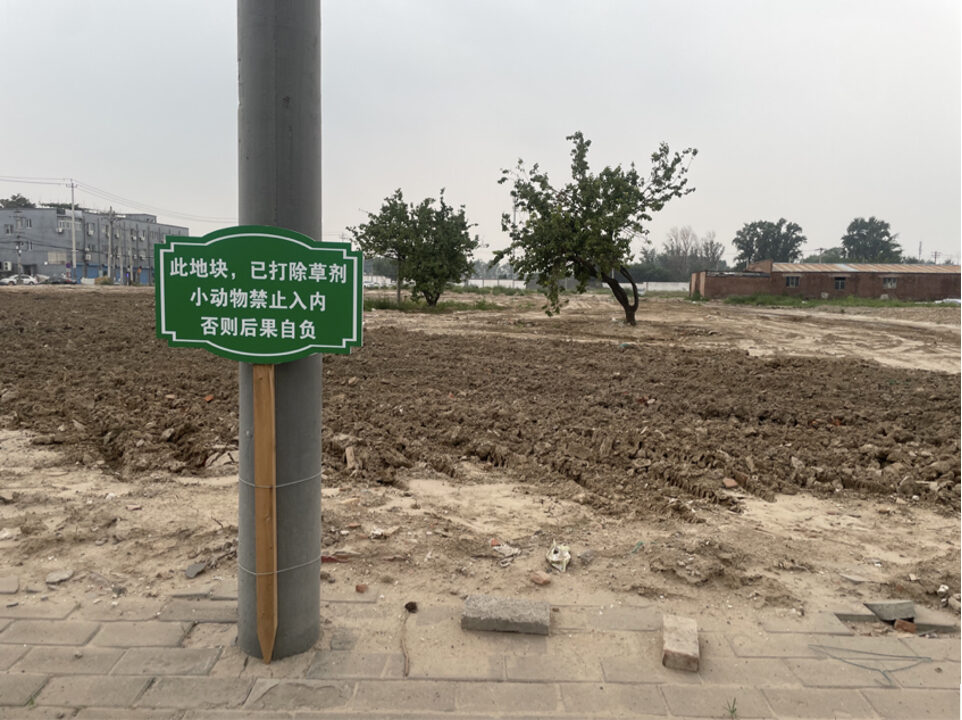
Dong: What are you doing now? Are you a middle school teacher?
Xiaojing: Now I am a primary school teacher in my hometown and constantly studying and writing about students. It was easy to connect with adults in Picun, but it is not the same case with children. Now I think I see myself as an adult, and it was difficult to be a “child” for the children
Dong: Thanks a lot, you have provided a unique perspective about Picun.
Wu: Thank you, Xiaojing.
Translation by Ningxin Chen, Sichuan Fine Arts Institute
Notes
[1] For more information on the sexual assault accusations made by female workers against Jia Zhiwei, a co-founder of the Migrant Workers’ Home, see Li Ma, #MeToo and Cyber Activism in China: Gendered Violence and Scripts of Power (Routledge, 2021): 63-65.

